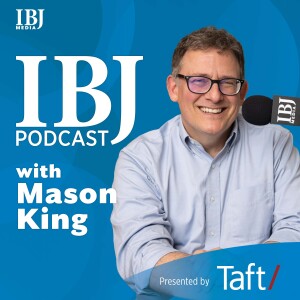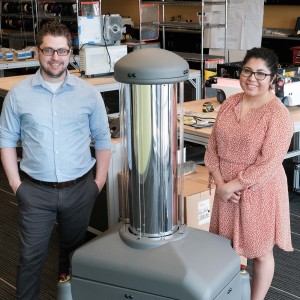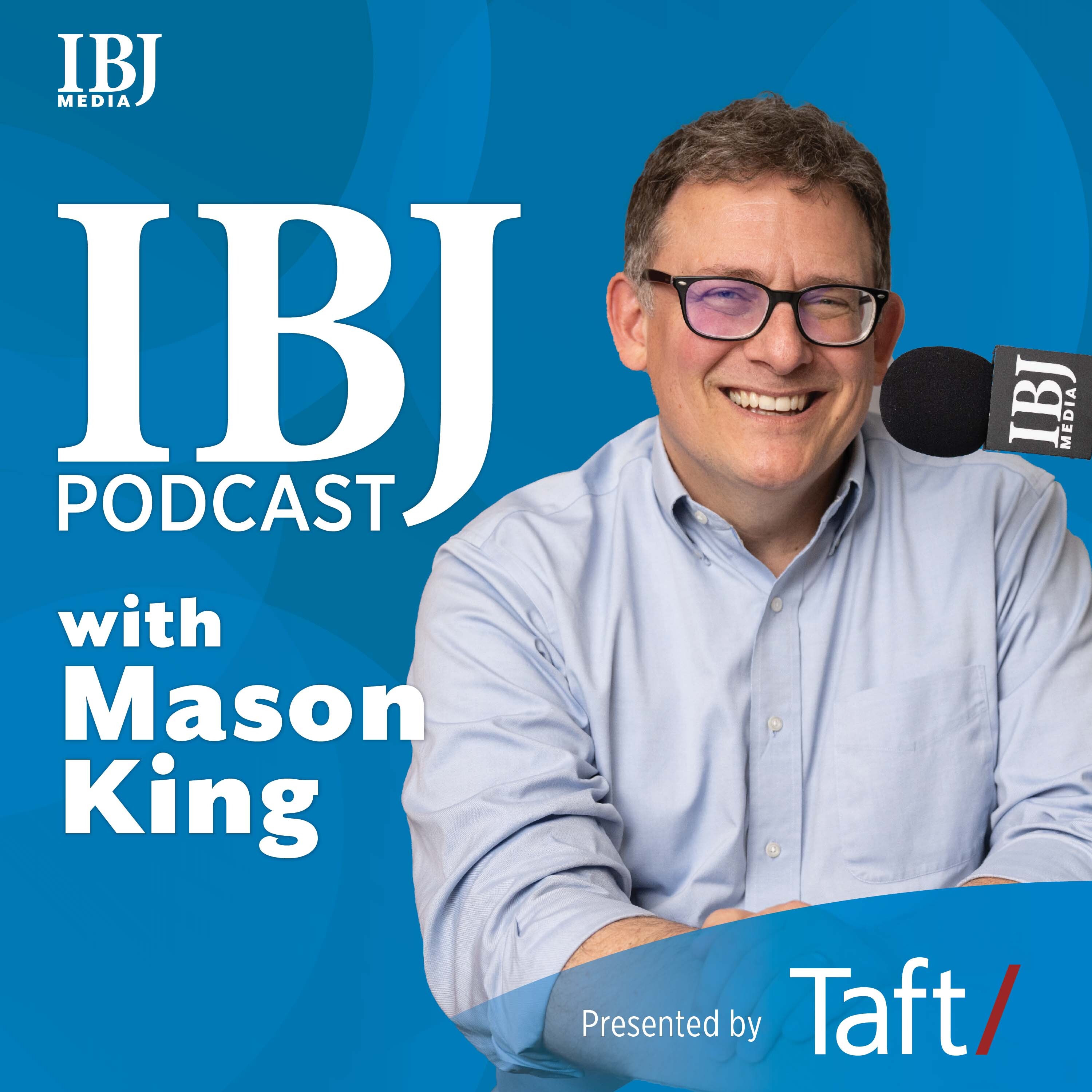Episodes

Monday Sep 14, 2020
A woman of color develops first wellness app for women of color
Monday Sep 14, 2020
Monday Sep 14, 2020
When Katara McCarty sees a need, she tries to find a solution. That's what led McCarty and her husband to start a church, a center for kids and a school in Africa.
Now, McCarty has a new project—a smart phone app called Exhale that is meant to help women of color cope with the stress, mind their mental health and develop confidence to achieve their goals.
McCarty talks with IBJ reporter Anthony Schoettle about why she thinks the app is needed, what it took to launch it and how she hopes to expand its offerings.
The IBJ Podcast is brought to you by the law firm Krieg DeVault.

Tuesday Sep 08, 2020
Dissecting IU Health's plans for a 44-acre campus downtown
Tuesday Sep 08, 2020
Tuesday Sep 08, 2020
IBJ health reporter John Russell has been covering Indiana University Health's plans to expand the Methodist Hospital campus by eight blocks, or 44 acres, anchored by a new $1.6 billion hospital.
The campus also will consolidate the operations of University Hospital, the Simon Cancer Center and much of the IU School of Medicine, all of which will move from the IUPUI campus.
Russell joins podcast host Mason King to talk about what IU Health has revealed about the campus—and what key questions remain.
You can also read Russell's latest story about why the Simon Cancer Center building will be closing, just a dozen years after it opened to significant fanfare.
The IBJ Podcast is brought to you by the law firm Krieg DeVault.

Monday Aug 31, 2020
Remodelers reveal what homeowners want in COVID era
Monday Aug 31, 2020
Monday Aug 31, 2020
The pandemic has been a boon for the home design and renovation industry, as many people scramble to create office space, improve their yards and make other changes to make life in quarantine more acceptable.
So podcast host Mason King talks to three industry experts about what clients now want, how the pandemic has affected their companies and how they work safely in clients’ homes. They are: interior designer Heidi Woodman, owner of Haus Love Interiors; Matt Troyer, owner of Emergent Construction; and Patrick Kestner, owner and principal architect of Still Architecture + Design.
They also talk about the latest trends, including larger kitchens, more color and dedicated pantry spaces.
The IBJ Podcast is brought to you by the law firm Krieg DeVault.

Monday Aug 24, 2020
The latest wisdom on kids and COVID-19 from a Riley Hospital specialist
Monday Aug 24, 2020
Monday Aug 24, 2020
Six months into the pandemic, parents are still struggling with what COVID-19 means for the kids. Should they be in school? Can they go on play dates? Can they hug grandma?
Of course, in many cases, there are no black and white answers to those questions. But host Mason King gets some educated opinions from Dr. James Wood, a pediatrician at Riley Children's Health and an expert in pediatric infectious diseases.
Plus, Wood explains multi system inflammatory syndrome (which he describes as "extremely rare") and theorizes why children may not be as affected by COVID-19 as adults.
The IBJ Podcast is brought to you by the law firm Krieg DeVault.

Sunday Aug 16, 2020
We're burning out on remote work and video calls. Here's how to get focused.
Sunday Aug 16, 2020
Sunday Aug 16, 2020
As the pandemic has stretched into months and the days seem to melt into each other, a vast majority of remote workers are burning out, according to a recent survey from Monster.com. At the very least, many are mired in remote working ruts. And the volume of boring and unnecessary video meetings just makes it worse.
As some workforces face at least several more months of working from home, burnout threatens to become a dire business problem. But is this as good as it’s going to get? And what can we do to improve Zoom calls?
Surely there are ways to tighten focus and become more productive, while keeping jobs from seeping further into home lives. And the answer requires help from managers, some of whom haven’t figured out how managing a virtual workforce is a different from supervising on-site employees.
For the latest edition of The IBJ Podcast, host Mason King spoke with three experts in remote working who have been watching the transition during the pandemic. They provide concrete suggestions for how employees and bosses can get on top of these challenges. First up are Kim and Todd Saxton, faculty members of the IU Kelley School of Business at IUPUI. The second guest is Karen Mangia, vice president of customer and market insights for Salesforce out of its Indianapolis office.
The IBJ Podcast is brought to you by the law firm Krieg DeVault.

Monday Aug 10, 2020
Pete the Planner on derailed college, early professional careers
Monday Aug 10, 2020
Monday Aug 10, 2020
The pandemic has raised all kinds of new questions about college and student loans—and the value of an online education versus attending in person.
Plus, what do you do if you graduated in May and still don't have a job?
Host Mason King explores those issues and more with IBJ columnist Peter "Pete the Planner" Dunn.
Also, read Dunn's latest column here.
The IBJ Podcast is brought to you by the law firm Krieg DeVault.

Monday Aug 03, 2020
The owner of Windsor Jewelry talks about surviving the riots and pandemic
Monday Aug 03, 2020
Monday Aug 03, 2020
Windsor Jewelry, located just south of the Circle on Meridian Street, was one of the businesses hardest hit by the riots that followed Black Lives Matter protests at the end of May.
The vandalism and looting came just days after Windsor Jewelry reopened following the pandemic shutdown.
The store is open again now, and the owner, Greg Bires, talked with podcast host Mason King about the one-two punch of the pandemic and violence and what it will take for Windsor and for downtown to recover.
Plus, hear from Mayor Joe Hogsett, who spoke to IBJ's editorial board last month about some of the very problems Bires is concerned about for downtown.
The IBJ Podcast is brought to you by the law firm Krieg DeVault.

Monday Jul 27, 2020
Monday Jul 27, 2020
Diana Brugh is a microbiologist with experience working with bacteria- and virus-killing ultraviolet lights. Her husband, Jason Brugh, is one of the state’s foremost robotics experts. And together, they've created a coronavirus-killing robot that they've just moved into the market.
UVNinja Lux is the first product from the couple's newest company, AutoBio Reduction. It moves around a workplace (after mapping the space) and uses ultraviolet let to kill bacteria and viruses.
Diana and Jason talks with podcast host Mason King about how they were able develop the product in just weeks, what it has been like working together, and what the robot costs. Plus, Diana explains her family's experience with the coronavirus that helped motivate the project.
To learn more, check out IBJ reporter Anthony Schoettle's story about AutoBio Reduction.
The IBJ Podcast is brought to you by the law firm Krieg DeVault.

Sunday Jul 19, 2020
Indy's top doc on the COVID response, masks, contact tracing, second wave
Sunday Jul 19, 2020
Sunday Jul 19, 2020
Dr. Virginia Caine has been in charge of the Marion County Public Health Department since 1994. Over her tenure she has fought waves of public health crises including HIV and AIDS, the H1N1 pandemic in 2009 and the ongoing scourge of black infant mortality. But never has she taken such a visible and constant public role of authority as she has over the last five months of the coronavirus crisis. For Indianapolis, she is as one of the key interpreters of data, prime shapers of policy and chief evangelizers for protective measures.
IBJ reporter Lindsey Erdody interviewed Dr. Caine last week about the frustrations and challenges of tackling the pandemic. Caine addresses the current state of local testing and contact tracing. She explains the reasoning behind the recent mask mandate and when it will be possible to make a call on running the Indianapolis 500. And she has an emphatic message for Marion Country residents who might not see the wisdom of following public health recommendations.
The IBJ Podcast is brought to you by the law firm Krieg DeVault.

Monday Jul 13, 2020
When will office workers return to downtown Indy?
Monday Jul 13, 2020
Monday Jul 13, 2020
Before the pandemic hit Indianapolis in March, some 155,000 people were working regularly downtown. In the weeks after Gov. Eric Holcomb ordered all non-essential workers to go home, just 5% or so of those workers remained. Essentially, the Mile Square became a ghost town.
Today, some of those workers are returning. Many restaurants are open again. And a few offices are open.
But IBJ reporters Samm Quinn and Anthony Schoettle spent a week talking with the leaders of downtown companies and learned that many are delaying plans to bring workers back to the office.
What are the ramifications for downtown? That's the subject of this week's podcast.
Want to know more? See Quinn and Schoettle's story at IBJ.com.
--
The IBJ Podcast is brought to you by the law firm Krieg DeVault.


